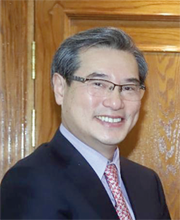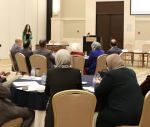You are here
Treasures of Jordan, from Umm Qais to Aqaba
Jun 27,2024 - Last updated at Jun 27,2024
As my wife and I prepare to leave Jordan upon completing my term in office as ambassador to this beautiful country, I have mixed feelings: of sadness, for leaving, and of pleasure at having been blessed to end my diplomatic service in a country loaded with history, holiness and kindness.
Just before my departure, I decided to write these words as my humble goodbye to Jordan.
During my relatively short diplomatic life in Jordan, the unique nature and people continued to open my eyes to the treasures of this country with a rich history and straddling roads connecting civilisations, the hub of exchange of cultures, the land showcasing human success stories of loving life amidst tribulations and unrelenting commitment to peace and stability.
Inspired by this beauty and rich history of Jordan, I once told Minister of Tourism and Antiquities Makram Queisi my impression of Jordan after I drove myself to many sites across the country: “I believe that Jordan as a whole should be inscribed on the World Heritage List.”
From Umm Qais to Aqaba, in many places, I could not help but be awed by the fascinating landscape and charming stories around them.
Last year, I appeared on Korean national TV to talk about safety in Jordan and introduce wonderful sites harbouring human history of thousands of years. I believe Koreans should expand the scope of tourism in Jordan beyond Petra, the Baptism Site and Mount Nebo. As soon as the ceasefire sets in Gaza, more Korean tourists than before would want to visit Jordan to experience and learn more about the human tracks of ancient times.
Tourism is all about stories, and no country has a treasure of stories to tell from the Bible and ancient history as Jordan does. Madaba, Mukawir, Jerash, Wadi Al Hasa, Wadi Numeira, Petra, Umm Qais, Hisban, Moab, Feinan, are only some examples of Jordan’s biblical reservoir. For that reason, I compiled and submitted to the Jordanian Ministry of Tourism some suggestions to promote tourism to biblical sites in the country, with a perspective of longer stays. This can be achieved through designating trekking trails, such as Moses’ Trail, Elijah’s trail, John the Baptist’s trail, Jacob’s trail, and linking biblical sites to nearby natural attractions to provide comprehensive programs for tourists. Jordan has a lot to offer in this field, and proper investment in this area would reflect very positively on Jordan’s economy.
As much as tourism is about history and natural beauty, it largely involves hospitality and generosity. People from ancient times until now have crossed paths in Jordan, and I cannot but express how deeply I was touched by Jordan’s kindness and humanitarian efforts to receive refugees from neighbouring countries and provide for them all means for a good life during their stay in Jordan. This explains Jordan’s openness, inclusiveness and embracing heart, traits that Jordan never abandoned from ages ago.
At a couple of Taekwondo events at the Zaatari and Azraq Camps for Syrian refugees in Jordan, organised by the World Taekwondo Federation and the Taekwondo Humanitarian Foundation, we were received with big smiles on the faces of children. They are being so well trained that one of them, Yahya Al Ghotany, was named by the International Olympic Committee among five athletes to take part in the Paris 2024 Olympics. All promising talents on the land of Jordan are given opportunity and care.
In this context, light must be shed on the investment in human resources in Jordan. Like Korea, Jordan relies heavily on human power for development, given the lack of natural resources. Stemming from this belief, Samsung R&D institute of Jordan doubled their high-skilled staff this year to develop an AI feature on mobile phones of automatic interpretation to Arabic for the Arab region. I hope to see more of this type of economic collaboration relying on Jordanian brains.
In this vein, the Korean government’s grant aid programme has been giving special attention to the education sector in Jordan, establishing, for example, three schools, mainly for Syrian refugees, in Irbid Mafraq and Zarqa (2017-2024), the Jordan-Korea Industrial School in Zarqa (JOKINZ) (2017-2023), and currently considering a project of the Korean Institute for Engineering Training (KIET) at the University of Jordan (2025-2029).
Jordan, however, has an important natural resource for renewable energy. With the presence of strong wind near Petra, two renewable energy fields were already established by Korean companies in Tafileh and Fujeij (wind power) alongside the Amman Asia power plants of Al Qatranah. Also, studies are being made for green hydrogen production in Aqaba.
Jordan can place itself as an energy hub in the region by investing in solar energy, wind power and human resources. In fact, Jordan is blessed with a location, history and human power that can make it a hub in the Middle East in many areas.
My memories from Jordan will always accompany me. Memories of natural beauty, rich history, big hearts and solidarity. I am retiring as Korean ambassador after 37 years of diplomatic service, but as soon as I reach home, I will start my honourary post bestowed on me by my Jordanian friends as Jordan’s ambassador to Korea!














Add new comment